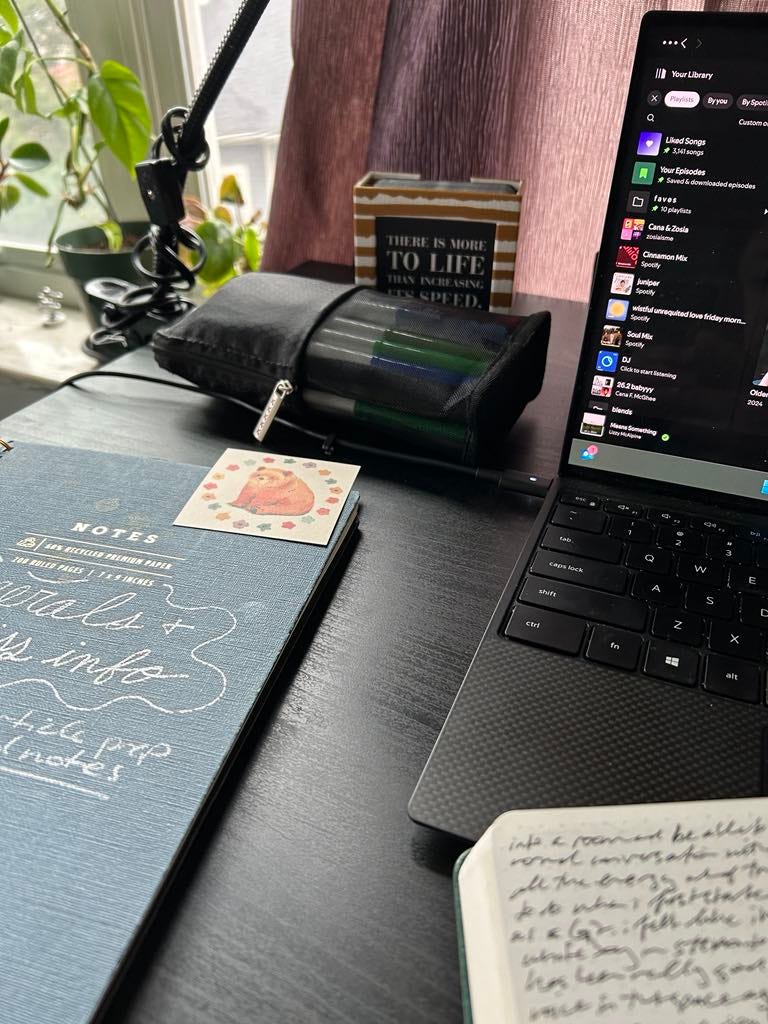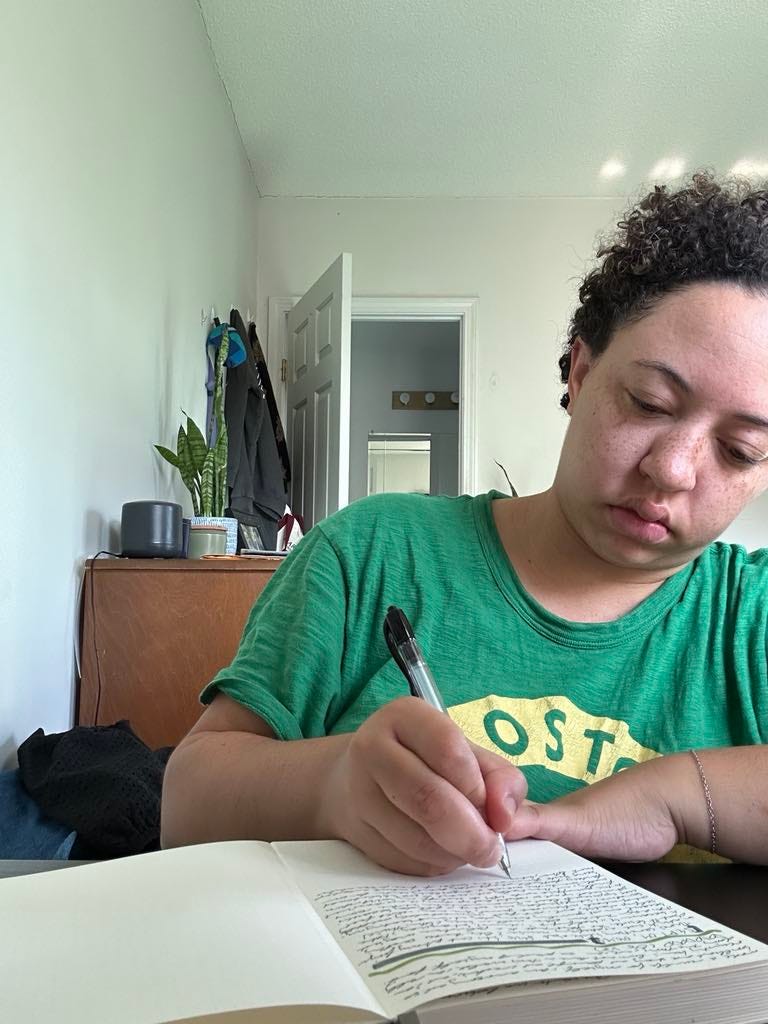on resonant bodies
what does it mean to make authentic work? and what does being a chorister have to do with it?
A quick note before we start: I am on a mission to reach my first 100 subscribers this year! Since this is a reader-supported project, you get to help by engaging with my writing in the form of subscriptions, likes, restacks, and comments. They are so valuable to achieving this milestone, and I love seeing notifications from familiar names and faces: truly warms my heart!! And don’t forget share with a friend or loved one, why dontcha?
(the backdrop)
i have recently been holding onto a daily writing goal!!!
in a dissertation diary from many weeks ago now, i told y’all about my writing practice during the month of august. rather than setting a word count goal, the rule i made was that i needed to leave a writing session having generated one new sentence or idea.
like many academics, i intend to write, but then i get stuck in reading, note-taking, or organizing without ever opening my document-du-jour. having a rule of generating *one* of my own thoughts each day motivated me to get out of planning mode and moving in a more productive direction.
sometimes i had reached my writing goal for the day, and yet i still putzed around moving commas and rewording a sentence that has bothered me for weeks and will probably bother me until the end of time. catching myself in those moments is a lesson in a) quitting perfectionism, and b) stopping while i’m ahead and trusting i will show up again tomorrow.
a lot of the writing advice i encounter revolves around writing [x] words per day or for [x] minutes/hours. and when i’m starting a new project, those bare minimums really help build confidence while i’m word vomiting.
but right now i can afford to be more deliberate with my words, and care more about the quality. but how do we know when we’re done for the day? what is “good enough”? how do i know when i’ve accomplished my goal?
let’s get into it.
a caveat: creativity is about discovery, NOT about making new things
being a researcher has helped me see that.
i firmly believe that the task that await us as artists and creative thinkers is not just about finding new things: in fact, that’s often a really tall order, and most of us will never actually achieve something 100% original. something something “art is theft.”
instead, i prefer to think about how to explore some existing thing and offer a new reflection, interpretation, or perspective about it. i now regularly try to implement a practice of writing down my own understanding of a topic, or generating my own words, before consulting secondary materials. fellow phd candidate kaelyn apple also mentioned in a recent video that provides strategies for dealing with writer’s block as an academic.
but here’s an idea of how this might look:
when i’m working on my novel or short stories, i’m trying to discover the lives of characters that have emerged from my subconscious. there’s an idea there about how i want to the characters to move, speak, feel, and my job is to bring that to the surface.
when i’m working on my dissertation, i’m trying to discover connections between sources — primary and secondary — that people have not mentioned before, and use those connections to generate new insights about what it means to Be in the world.
when i listen to music that i have loved since i was 13, i am learning things about myself that were always there, just never fully understood.
when i took away the pressure to do something brand new every time i sat down to write, writing got easier, and my original thoughts got clearer.

ideas that resonate
but when i say being original, i think what i really mean is being genuine. it also means trying to stay true to the inner voice guiding me through the research and writing process.
ideas often sing to me when i am in a flow state. thoughts start to move of their own volition across my word docs, and i become a witness to their taking shape. (it reminds me of when my students start to take charge of the discussion during section, which allows me to step back and witness their brilliance that i’ve helped them find). i get to be a vessel for magical thoughts, and it’s a very tactile process as they flow into the world.
maybe ideas sing to me because i study music and sound for a living, and have a rich inner (sonic) life. or maybe it’s because i am a lifelong chorister who finds choral music a beautiful practice of being in community through listening. or maybe it’s because singing is a bodily practice that, when done well, requires good awareness of body and mind.
but when ideas start sing, i take it as a sign that things are resonating with me. it’s a sign that i have charmed creativity to me, to paraphrase the words of liz gilbert. it means that what i’m externalizing in writing is in-tune with the voice whispering at me from within.
it’s a sign that what’s happening on the outside is resonating with the instincts brewing on the inside.
connecting to a feeling, not the outcomes
another of my favorite youtubers, Evelyn, recently talked about using chatgpt to do the work of filtering out “bad” ideas so that we don’t have to. i’ve used AI to help me generate paper titles, but due to my slight technophobia, i haven’t wanted to give it much more of my intellectual property.
i won’t speak for everyone, but often, when we sit down to write or craft or do a puzzle or start a run, it sucks a little at first. it’s a little painful, embarrassing, awkward, and i’m someone who likes to write and wants to be a writer. but getting started is always a little harder than i initially expect. and before we can do things we like, we have to do the un-fun parts AND remind ourselves that doing bad work does not make us a bad person.
i digress.
here’s the parting gift:
when you think you’re done for the day, ask yourself three questions:
“is this good?
is it new?
am i satisfied?”
probably the most important one is “am i satisfied?” luckily, my musical background has done nothing if not taught me how to know when i’ve given a solid performance (ok, it’s taught me so much more, but stick with me).
the tired feet and knees, the achy voice, the release of pride from nailing a tricky passage even after flubbing an entrance elsewhere: when i feel these things after singing in a concert or church service, something went right. and usually im not alone in those feelings: my choir-mates feel it, and audiences can tell, too. so there’s a solidarity in having given ourselves to the bigger picture of creating a collective, community experience.
i used to try to analyze this feeling of rightness, but having enough good concerts throughout your life forces you to just accept a win and trust that momentum will encourage more experiences like that to happen.
i feel a similar bodily tiredness after a strong writing session. my fingers start to buzz a little. i have a sense of confidence rising from my core and up my spine. sometimes my jaw will hurt from clenching it eagerly.
maybe i only added 50 words instead of 200, or maybe i only actively wrote for 15 of my intended 45 minutes. or maybe i needed to write 400+ words to feel good. but the feeling is still the same.
all of this to say: you will have a vibe about whether what you’ve done feels right and good and enough. it will resonate. just trust it.

thank you dearly for your eyes and ears, and for indulging me on this slightly different post format this week. i would love to hear some other tips for dealing with the pressure to be “original” or how you determine when things are good enough for you, so feel free to drop a comment down below!
lastly, if you feel so called, please share this with a friend, upgrade your subscription, or leave a one-time tip! i am so grateful to have you here in the weeds with me, and honored to live out this version of a writer’s life. :)





I've been writing "professionally" for 11 years and I still spend way too much time moving the commas around and rewording sentences and getting stuck in research mode! So funny how these things trip us up and hold us back, but loved your suggestions for overcoming them.
Personally, I go for a walk or a bike ride whenever I find myself falling too much into the perfectionism traps, or ill move to writing on my phone or go to the couch instead of the desk. I also leave reworking the one sentence of an article that's bugging me until the very end, and then I usually can come back with fresh eyes and fix it no worries. Once I've got my first draft down, it always feels easier to edit than it does to start again with the blank page. Then I either reach a point of "good enough" or sometimes get the holy grail of "daaaamn this is good!", but that's a rarity 😂